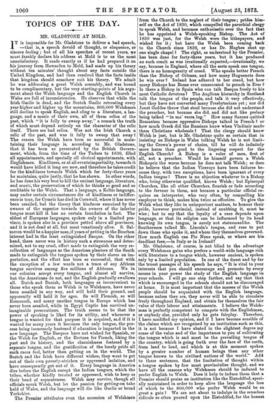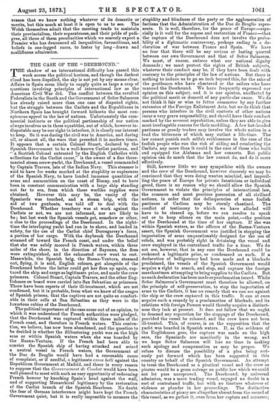TOPICS OF THE DAY.
MB. GLADSTONE AT MOLD.
1 T is impossible for Mr. Gladstone to deliver a bad speech, I_ —that is, a speech devoid of thought, or eloquence, or sincere feeling ; but of all his speeches of recent years, we must frankly declare his address at Mold is to us the moat unsatisfactory. It reads exactly as if he had prepared it On his journey from Hawarden to Mold, had made up his theory without ten minutes' thought about any facts outside the United Kingdom, and had then resolved that the facts inside that kingdom should somehow suit his theory. We admit he was addressing a great Welsh assembly, and was bound to be complimentary, but the very starting-points of his argu- ment about the Welsh language and the English Church in Wales are full of inconsistencies. He observes that while the Irish Gaelic is dead, and the Scotch Gaelic retreating every year higher and higher up the mountains, 800,000 Welshmen still decline to speak English, and cling to a literature, a lan- guage, and a music of their own, all of them relics of the past, which " it is folly to sweep away," a remark the truth of which must depend entirely on the character of the relic itself. There are bad relics. Was not the Irish Church a relic of the past, and was it folly to sweep that away The reason the Welsh have been so successful in main- taining their language is, according to Mr. Gladstone, that it has been so persecuted by the British Govern- ment, which, from the time of the Tudors to 1830, filled all appointments, and specially all clerical appointments, with Englishmen. Kindliness, or at all events impartiality, towards it would have killed it long ere now, and therefore he takes credit for the kindliness towards Welsh which for forty-three years he maintains, quite justly, that he has shown. In other words, he has done his very best to kill the ancient language, literature, and music, the preservation of which he thinks so good and so creditable to the Welsh. That a language, a Keltic language, may under certain circumstances die of kindliness or indiffer- ence is true, for Cymric has died in Cornwall, where it has never been assailed, but the theory that kindness exercised by the owners of the superior towards the owners of the inferior tongue must kill it has no certain foundation in fact. The oldest of European languages, spoken only in a limited pro- vince, is spoken also in a province petted above all provinces, and it is not dead at all, but most vexatiously alive. S. Sal- meron would be a happier man,if years of petting in the Bourbon interest had in the least extinguished Basque. On the other hand, there never was in history such a strenuous and deter- mined, not to say cruel, effort made to extinguish the very re- collection of languages as the American planters of the South made to extinguish the tongues spoken by their slaves on im- portation, and the effort has been so successful, that with the exception of a few words not a trace of any African tongue survives among five millions of Africans. We in our colonies accept every tongue, and almost all survive, but the Americans do not, and the English gradually swallows all. Dutch and Danish, both languages as inconvenient to those who speak them as Welsh is to Welshmen, have never been assailed in any way, and still hold their ground, and apparently will hold it for ages. So will Flemish, so will Romansch, and many another tongue in Europe which has never been assailed, while in Egypt Coptic has survived un- imaginable persecutions. The truth seems to be that the power of speaking is liked for its utility, and whenever a tongue is wanted for that purpose it is acquired, and if it is wanted for many years it becomes the only tongue, the pro- cess being immensely hastened if education is imparted in the new language. The Basques have not wished for Spanish, or the Welsh for English, or the Bretons for French, liking the past and its history, and the clannishness fostered by a separate tongue, and the gratification of the lonely pride all such races feel, better than getting on in the world. The Scotch and the Irish have different wishes, they want to get out of their own poverty-stricken or oppressed isolation, and have consequently got out of it. Every language in America dies before the English except the Indian tongues, which the tribes, whether kindly treated or oppressed, wish to keep as their bond of separateness. Welsh may survive, though all officials speak Welsh, but let the passion for getting-on take hold of Wales, and the language will die like Gaelic or broad Yorkshire.
The Premier attributes even the secession of Welshmen
from the Church to the neglect of their tongue ; prides him- self on the Act of 1830, which compelled the parochial clergy to speak Welsh, and becomes enthusiastic over the fact that he has appointed a Welsh-speaking Bishop. The Act of 1830 was just, for the Welsh were the tithepayers, and wished for it ; but have the Welsh been coming back , to the Church since 1830, or has Dr. Hughes shut up one single chapel I The right, as understood by the Premier, has been done for forty-three years, but it has produced no such result as was irrationally expected,—irrationally, we say, because in England, where all the sects speak one tongue, there is no homogeneity of creed. Who speaks better French than the Bishop of Orleans, and how many Huguenots does he win over ? Ireland has adhered to her creed, but how- many Bishops has Rome ever consecrated to preach in Erse Is there a Bishop in Spain who can talk Basque freely to his most Catholic devotees & The Anglican hierarchy in Scotland talk the tongue of the people, and talk it very effectively,. but they have not converted many Presbyterians yet ; nor did Janet Geddes throw that stool because she did not understand the preacher, but because she did, and did not like prelacy being talked " in ma' verra lug." How many Saxons quitted Romanian because oppressive Bishops talked in French ? or how much Greek did the Russians know when Vladimir made• them Christians wholesale & That the clergy should know- Welsh is just, but is Mr. Gladstone quite so certain that in- insisting on Bishops in Wales talking Welsh he is not limit- ing the Crown's power of choice, till he will do infinitely more harm than good to the lingering respect for the English Church? A Bishop is a ruler of men, first of all, not a preacher. Would he himself govern a Welsh Bishopric the worse because he does not talk Welsh; or does he believe that the Indian Viceroys have been failures be- cause they, with two exceptions, have been ignorant of every Indian tongue ? There is no objection whatever to a Bishop, who, being otherwise qualified, knows Welsh ; but Episcopal Churches, like all other Churches, flourish or fade according to the fervour in them, not because a particular official re- quires an interpreter, who very often, by compelling his- employer to think, makes him twice as effective. To give the Welsh what they like in unimportant matters, to honour their pride, however provincial, instead of snubbing it, must be- wise ; but to say that the loyalty of a race depends upon• language, or that its religion can be influenced by its head knowing its own tongue, is surely not statesmanlike. The Southerners talked Mr. Lincoln's tongue, and rose to put• down those who spoke it, and whom they themselves governed. How much English can Pio Nono speak, or where are his deadliest foes,—in Italy or in Ireland?
Mr. Gladstone, of course, is not blind to the advantage every Welshman gains who prefers a world-wide language rich with literature to a tongue which, however ancient, is spoken only by a limited population. In one of the finest and by far the truest passages of his speech he says, " It is vital to your interests that you should encourage and promote by every means in your power the study of the English language in your schools. I will go one step farther, and say that that which is encouraged in the schools should not be discouraged at home. It is most important that the masses of the Welsh people should be acquainted with the English language, because unless they are, they never will be able to circulate freely throughout England, and obtain for themselves the fair value of their labour and attainments. I believe the Welsh- man is perfectly competent to compete with the Englishman,. or anybody else, provided only he gets fairplay. Therefore, I have modified my opinion, and if I have become sensible of the claims which are recognised by an institution such as this, it is not because I have abated in the slightest degree my sense of the value and of the importance to you of cultivating the tongue which is and must be the prevailing tongue of the country, which is going forth over the face of the earth, from land to land, and which is at this moment spoken by a greater number of human beings than any other tongue known to the civilised nations of the world." Add to these sentences, that the limitation of thought within a tongue spoken by few must provincialise thought, and we have all the reasons why Welshmen should be induced to prefer English to Welsh. Does it help to induce them that a Premier should praise an institution like the Eisteddfod, speci- ally maintained in order to keep alive the language the loss of which to the 800,000 who prefer Welsh would be so great a gain ? We are not about to indulge in the senseless ridicule so often poured upon the Eisteddfod, for the honest
reason that we know nothing whatever of its demerits or merits, but this much at least it is open to us to see. The Welsh themselves admit that the meeting tends to maintain their provincialism, their separateness, and their pride of pedi- gree, all three of them peculiarities which we scarcely expect a Premier who has denounced all inequalities, favouritisms, and beliefs in one-legged races, to foster by long - drawn and mellifluous admiration.































 Previous page
Previous page